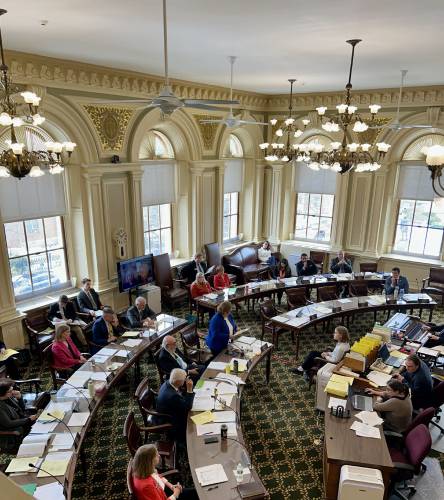Senate passes bill that would require a book complaint procedure in public schools

New Hampshire's Senate debates a bill on April 5 that would require school boards to set procedures for handling complaints about books in schools. JEREMY MARGOLIS
|
Published: 04-08-2024 5:30 PM
Modified: 04-19-2024 1:25 PM |
A Republican-backed bill that would require local boards to lay out procedures for challenging books used in school classrooms and libraries passed New Hampshire’s Senate on a 14-10 party-line vote.
Debate over the bill, SB 523, pitted Republicans, who argued it was necessary to protect parental rights, against Democrats, who countered it would amount to a book ban and unduly burden public school administrators.
The bill would require that school principals contact parents or guardians who object to school content within 10 days of filing a complaint. The principal would have 15 days to make a determination on how to handle the material at issue, which could ultimately be appealed to the local school board.
In addition to books, parents would be able to object to films, photos, plays, dances and statues.
A previous version of the bill would have ordered school districts to remove from school libraries any material that was deemed “harmful to minors,” but the amended version passed by the Senate removed that language and instead focused on the establishment of complaint procedures.
On Friday, Republican Senators emphatically disputed any characterization of Senate Bill 523 as a book-banning law and instead described it as process-focused.
“It is deceptive to say that it is a book banning,” said bill sponsor Sen. Kevin Avard, a Nashua Republican. “We’re empowering parents to object to materials that they find questionable with a meaningful process.”
Democrats responded that parents already have the power to prevent their own children from accessing materials they object to and argued that the legislation would allow parents to restrict access to materials from all children.
Article continues after...
Yesterday's Most Read Articles
“Why does this one parent have the opportunity to influence what I might be okay with for my child to read?” asked Sen. Suzanne Prentiss, a West Lebanon Democrat.
Other Senate Democrats made more philosophical arguments.
“Our democracy would not have been founded, would not have grown strong, and would not be sustainable were it not for the availability of materials deemed inappropriate and offensive,” said Sen. Shannon Chandley of Amherst. “The free exchange of ideas is essential to a functioning society.”
Some Senate Democrats also worried that responding to book complaint processes could hamstring principals’ time.
The Senate’s passage of the bill came two months after the House failed to pass a proposal that would have given the state’s Board of Education authority to rule on school book complaints. Prior to that bill being killed, the House devolved into chaos when one of its sponsors, Republican Rep. Glen Cordelli, began reading a scene from the book “Speak” on the House floor that involved sexual assault.
The mood on the Senate floor was comparatively calm last week as the legislators debated their bill, the second of the day that focused on parent’s rights in schools. Earlier Friday, the Senate passed a bill that would require teachers to respond “completely and honestly” to parents’ questions about their children – legislation that some Senate Democrats worry could force teachers to “out” LGBTQ students.
Both bills will now head to the House.







 Jesse Sullivan pleads guilty to second-degree murder of half-brother, Zackary
Jesse Sullivan pleads guilty to second-degree murder of half-brother, Zackary ‘It’s a ritual’: Best practices and benefits in caring for bonsai
‘It’s a ritual’: Best practices and benefits in caring for bonsai ‘Something to chase’: Pascal Zabayo’s art fundraiser grows soccer from Concord to Kampala, Uganda
‘Something to chase’: Pascal Zabayo’s art fundraiser grows soccer from Concord to Kampala, Uganda  Joan Vallieres retires from coaching and character building at Concord Crew
Joan Vallieres retires from coaching and character building at Concord Crew
